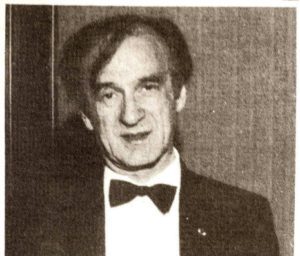
Elie Wiesel in Denver, 1987
The following exclusive interview with Nobel Laureate Elie Wiesel was obtained June 8, 1987, the day Wiesel received an honorary doctorate, along with fellow survivor, Denver businessman Emil Hecht, from the University of Denver.
IJN Editor and Publisher Miriam Goldberg and IJN Senior Editor Rabbi Hillel Goldberg conducted the interview.
IJN: Since you’ve won the Nobel Prize you seem to be traveling extensively, speaking extensively. Do you still write?
My life has not changed; my lifestyle has not changed either. I study every day and I write every day. I somehow manage to find time. I don’t travel that much. A little bit more, because it’s impossible to say no to certain demands, certain pressures, when they involve Jewish communities.
IJN: When you talk about writing, are you preparing another book?
Always. I never give up a manuscript before I have begun another one. So I’m always in the middle of something.
IJN: Your article, in the English volume dedicated to Chief Rabbi Jakobovits, on the Talmudic schools of Hillel and Shammai — is this part of your new book?
This is part of my book on the Talmud, which will be ready probably this year.
IJN: Do you have any moral guidance to offer on the AIDS crisis?
Compassion. These are desperate people, and I think we should give them all the compassion we are capable of. If not, what will happen to them? What will happen to their families? Their friends?
IJN:In Africa, an increasing population of AIDS victims are innocent children born to mothers with the disease. Children succumb within a year or two or three. Does that recall unpleasant memories?
No. I don’t compare it. I don’t compare anything to the hurban (destruction, Holocaust) that happened to the Jewish people. It can serve as a point of reference, but never as a source of analogy. It’s enough — child victims of AIDS — strong enough, powerful enough, tragic enough. Why compare it?
IJN: Do you define yourself professionally as a writer, teacher, peace activist?
I don’t define myself as a professional anything. I’m a student, and I’m a teacher. I’m a writer and I try to be an activist. It’s all the same. I’ve always been that way, I guess. The person who writes, the person who studies, the person who teaches, the person who tries to do something for the Jewish people.
IJN: What, in your view, is the most vital Jewish obligation in the world today?
I think the most vital obligation, of course, is memory, to remember. If we remember where we come from then we will know where we go, and there’s always somewhere to go. If we forget where we come from — as a people we come from Sinai, as an individual we come each one of us from our respective homes, childhoods; and the danger, I think is disunity, the polarization of the Jewish people.
IJN: Do you have any solutions?
No. Solutions I never have. I only have questions. I know the problems, but I don’t know how to solve them.
IJN: Not that this is a solution, but when you speak about your son being in an Orthodox day school, is this a leaning, a direction?
Personally, it’s for me. I come from this background and all I want is for him to study the way I did, even though I know he will never be able to study the way I did because the world has changed. Even the yeshiva today is not the yeshiva we had when I was a student. But I want him to grow up Jewish, to learn to respect learning and what Jewish tradition is all about.
IJN: How can we encourage people to follow this philosophy?
I think it is to show the beauty in Judaism. There is not only much truth, but much beauty in Judaism. For Jews, obviously. Always for Jews. For other people they have their own ways and their own gates to open. But for us there is nothing but Torah, ethically, aesthetically, culturally. I think there is much to be found there for a person to feel fulfilled.
IJN: Has your thinking on G-d changed since the Holocaust?
I don’t think about G-d. It’s something so personal, so profound, I cannot think about it. I try to speak to G-d, but not about Him.
IJN: Does it distress you that the Holocaust museum design may have to be changed?
I resigned [from the US Memorial Holocaust Council] last December. Since then I do not know what’s happening.
IJN :Could you tell us why you did resign as head of the Holocaust museum?
No, not yet. For the moment, what I said is that the time had come to give it to practical people, to pragmatists, those who know how to raise funds, find contractors, engineers, and so forth.This is not my field. My field is ideas. Of course there were other reasons, but I don’t want to go into it because I want people to help the museum if it goes in the right direction.
IJN: What is the right direction?
The right direction is mainly that it is a project to remember the six million Jews that died, the way they lived before they were killed, the way they were killed. Why? The Holocaust is a Jewish tragedy, although it has universal implications.
IJN: Is it realistic to expect that in a country under whose Constitution everyone has equal rights — a country based on political pluralism — that there can be a government-sponsored memorial for one people?
Why not? Sure. All people have the same right to ask for the same projects. And there will be projects for others as well. I uphold that. I will help them. What I’m against is mixing them together.
IJN: I first met you at the Babi Yar Park dedication in Denver. We have since had a memorial, a dedication, but a great deal of controversy arose when the Ukrainians said they wanted to be part of it. Because federal money was involved, it became necessary.
But it has caused a great deal of divisiveness within the community. Is this a simple yes or no?
I’m not familiar with the situation.
IJN: Even if you are not familiar with Denver, was the Ukrainian situation at all . . .
I don’t know. I cannot comment.
IJN: Do you have any plans or intentions to turn your papers over to some academic institution?
Probably, sure. Certainly.
IJN: Who are, or were, your role models in writing?
I remain very interested in the Aggadah, the Talmud, the Midrash, with all kinds of extraneous influences as well. Dostoevsky, Kafka — they’re obvious [influences].
IJN: I mean stylistically.
Stylistically, no one should take anyone as a model. If I can’t write in my own style, if I cannot invent my own style, I shouldn’t write.
IJN: You certainly have developed your own style in a very effective way — trial and error?
Yes, but that’s what I’m trying to do, find my own style. If anyone else could write like I write. I wouldn’t write it. What for?
IJN: Do you think that the Pollard affair and the Israel connection to the Iran affair revealed an undercurrent of anti-Semitism?
Not at all. I must tell you I’m relatively surprised. Look, what we have now is the Iranian affair. And yet there is no anti-Semitism. I haven’t read anti-Semitic articles in the newspapers. I don’t know about Denver, but I can tell you in the national press, not a single anti-Semitic article. Either that shows that they talk about it so low we don’t hear it, or it shows a maturity of the American public.
IJN: How is your wife?
Fine, thank you. She translates my works.
IJN: Do you still write mostly in French?
Oh, yes. Even most lectures I do first in French then translate it.
IJN: Do you write anything of a sustained nature in Hebrew?
Never. I have written articles in Hebrew. I wrote for Yediot (Israeli newspaper in the 1950s). But something serious, I don’t think I could.
IJN: Do memories of the Holocaust ever leave a survivor?
No.
IJN: You’ve written about the trivialization of the Holocaust. What is the cause, and what is the solution?
Well, the cause is because we succeeded well. Beginning with a few, we began teaching and writing and became a success story. I don’t know the solution.
Because if I had to choose, really, between keeping it pure for only a few, or allowing it to be trivialized by many, I would surely opt for the first solution.
Just as we were forced for 45 years to fight against forgetting the Holocaust, now our main task is to fight against trivializing it. It is becoming more and more trivialized, cheapened, commercialized . . . the source of pornography. Political pornography or real pornography.
In a way, I feel responsible. I opened some doors for so many people to read. So I don’t know the solution. But not speaking about the Holocaust is not the solution, either.
Copyright © 2016 by the Intermountain Jewish News
















